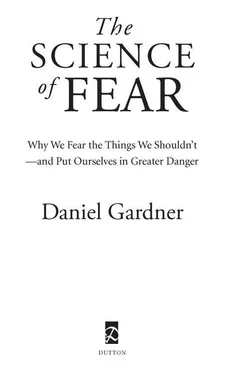Daniel Gardner - The Science of Fear
Здесь есть возможность читать онлайн «Daniel Gardner - The Science of Fear» весь текст электронной книги совершенно бесплатно (целиком полную версию без сокращений). В некоторых случаях можно слушать аудио, скачать через торрент в формате fb2 и присутствует краткое содержание. ISBN: , Издательство: Penguin Group (USA) Incorporated, Жанр: Психология, Политика, Прочая научная литература, на английском языке. Описание произведения, (предисловие) а так же отзывы посетителей доступны на портале библиотеки ЛибКат.
- Название:The Science of Fear
- Автор:
- Издательство:Penguin Group (USA) Incorporated
- Жанр:
- Год:неизвестен
- ISBN:9780525950622
- Рейтинг книги:3 / 5. Голосов: 1
-
Избранное:Добавить в избранное
- Отзывы:
-
Ваша оценка:
- 60
- 1
- 2
- 3
- 4
- 5
The Science of Fear: краткое содержание, описание и аннотация
Предлагаем к чтению аннотацию, описание, краткое содержание или предисловие (зависит от того, что написал сам автор книги «The Science of Fear»). Если вы не нашли необходимую информацию о книге — напишите в комментариях, мы постараемся отыскать её.
The Science of Fear — читать онлайн бесплатно полную книгу (весь текст) целиком
Ниже представлен текст книги, разбитый по страницам. Система сохранения места последней прочитанной страницы, позволяет с удобством читать онлайн бесплатно книгу «The Science of Fear», без необходимости каждый раз заново искать на чём Вы остановились. Поставьте закладку, и сможете в любой момент перейти на страницу, на которой закончили чтение.
Интервал:
Закладка:
Table of Contents
Title Page
Copyright Page
Dedication
Epigraph
1 - Prehistoric Refugee
2 - Of Two Minds
3 - The Death of Homo economicus
4 - The Emotional Brain
5 - A Story About Numbers
6 - The Herd Senses Danger
7 - Fear Inc.
8 - All the Fear That’s Fit to Print
9 - Crime and Perception
10 - The Chemistry of Fear
11 - Terrified of Terrorism
12 - There’s Never Been a Better Time to Be Alive
Notes
Bibliography
Acknowledgements
Index
About the Author

DUTTON
Published by Penguin Group (USA) Inc.
375 Hudson Street, New York, New York 10014, U.S.A.
Penguin Group (Canada), 90 Eglinton Avenue East, Suite 700, Toronto, Ontario M4P 2Y3, Canada
(a division of Pearson Penguin Canada Inc.); Penguin Books Ltd, 80 Strand, London WC2R
0RL, England; Penguin Ireland, 25 St Stephen’s Green, Dublin 2, Ireland (a division of Penguin
Books Ltd); Penguin Group (Australia), 250 Camberwell Road, Camberwell, Victoria 3124,
Australia (a division of Pearson Australia Group Pty Ltd); Penguin Books India Pvt Ltd,
11 Community Centre, Panchsheel Park, New Delhi—110 017, India; Penguin Group (NZ),
67 Apollo Drive, Rosedale, North Shore 0745, Auckland, New Zealand (a division of Pearson
New Zealand Ltd.); Penguin Books (South Africa) (Pty) Ltd, 24 Sturdee Avenue, Rosebank,
Johannesburg 2196, South Africa
Penguin Books Ltd, Registered Offices: 80 Strand, London WC2R 0RL, England
Published by Dutton, a member of Penguin Group (USA) Inc.
First printing, July 2008
Copyright © 2008 by Daniel Gardner
All rights reserved

REGISTERED TRADEMARK—MARCA REGISTRADA
1. Fear. I. Title.
Without limiting the rights under copyright reserved above, no part of this publication may be reproduced, stored in or introduced into a retrieval system, or transmitted, in any form, or by any means (electronic, mechanical, photocopying, recording, or otherwise), without the prior written permission of both the copyright owner and the above publisher of this book.
The scanning, uploading, and distribution of this book via the Internet or via any other means without the permission of the publisher is illegal and punishable by law. Please purchase only authorized electronic editions, and do not participate in or encourage electronic piracy of copyrighted materials. Your support of the author’s rights is appreciated.
While the author has made every effort to provide accurate telephone numbers and Internet addresses at the time of publication, neither the publisher nor the author assumes any responsibility for errors, or for changes that occur after publication. Further, the publisher does not have any control over and does not assume any responsibility for author or third-party Web sites or their content.
http://us.penguingroup.com
For Sandra
“Fear is implanted in us as a preservative from evil; but its duty, like that of the other passions, is not to overbear reason, but to assist it.”
—SAMUEL JOHNSON
Prologue: 1,595
Anyone who saw it will never forget it. And almost everyone saw it. When the first jet darted out of that crisp blue September sky and crashed into the World Trade Center, only a single television camera—on the street filming city officials doing some mundane task now long forgotten—captured the image. But as the tower burned, alerts flashed through wires and airwaves. The world’s electronic eyes turned, opened, and waited. When the second plane streaked in, an immense audience— perhaps hundreds of millions—saw the jet, the angry explosion, the gushing smoke, the glass and steel raining down like confetti in a parade. They saw it live. It was so clear, so intimate. It was like watching the whole awful spectacle through the living-room window.
Those who didn’t see the attack live soon would. In the frantic hours and days that followed, the images were repeated over and over and over. They were everywhere. From London to Moscow and Tokyo. From the peaks of the Andes to the forests of Madagascar and the Australian desert. In every city, region, and village within reach of modern communications media—almost the entire planet—people witnessed the tragedy. Never in the history of the species had there been such a communal experience.
Almost 3,000 people died. Hundreds of thousands lost family and friends. It was an enormous crime. And yet, the attacks of September 11 did not inflict personal loss on the overwhelming majority of Americans, much less the population of the world at large. On September 12, the rest of us had to go back to the daily routine of living. But things had changed. How could they not after what we had seen?
Some of the changes were small, or at least they seemed trivial next to what had happened. People stopped flying, for one. When commercial air travel resumed several days after the attacks, the planes taking off were almost empty.
A big reason was those images. They were so visceral. Sure, there are lots of flights every day and the chances of being on one that gets hijacked and slammed into an office tower may be tiny. But that didn’t seem to matter. Airports were unnerving. Flying felt strange and dangerous.
We all got to know the victims’ families in the weeks and months after the attack. The media were filled with interviews, profiles, and terrible stories of loss, making the shocking event even more deeply personal. And there was so much talk of worse to come. Politicians, pundits, and experts talked about terrorism as if it were the Fifth Horseman of the Apocalypse. Death and destruction could come countless ways, we were warned: poison in town water supplies, planes crashing into nuclear reactors, genetically engineered smallpox virus unleashed in the subway, dirty bombs, suitcase nukes in the hold of some anonymous cargo ship.
Then came the news that several people had been killed by anthrax-infected mail. Anthrax. No one saw that coming. Months before, we were safe and prosperous. Suddenly, we were butterflies in a gale. Grim-faced politicians advised everyone to pay attention to color-coded terror alerts. Stock up on emergency supplies. Don’t forget to buy duct tape so you can seal windows and doors against chemical or biological attacks. And while you’re at it, pray to God almighty that we might see the next day’s dawn.
It was an unreal, frightening time, and it was predictable that people would flee the airports. Perhaps surprisingly, though, they didn’t start digging backyard bomb shelters. Instead, most went to work and carried on living. They just didn’t fly. They drove instead.
Politicians worried what the mass exodus of Americans from planes to cars would do to the airline industry, so a bailout was put together. But no one talked about the surge in car travel. Why would they? It was trivia. There were deadly threats to worry about.
But what no politician mentioned is that air travel is safer than driving. Dramatically safer—so much so that the most dangerous part of a typical commercial flight is the drive to the airport.
The safety gap is so large, in fact, that planes would still be safer than cars even if the threat of terrorism were unimaginably worse than it actually is: An American professor calculated that even if terrorists were hijacking and crashing one passenger jet a week in the United States, a person who took one flight a month for a year would have only a 1-in-135,000 chance of being killed in a hijacking—a trivial risk compared to the annual 1-in- 6,000 odds of being killed in a car crash.
Читать дальшеИнтервал:
Закладка:
Похожие книги на «The Science of Fear»
Представляем Вашему вниманию похожие книги на «The Science of Fear» списком для выбора. Мы отобрали схожую по названию и смыслу литературу в надежде предоставить читателям больше вариантов отыскать новые, интересные, ещё непрочитанные произведения.
Обсуждение, отзывы о книге «The Science of Fear» и просто собственные мнения читателей. Оставьте ваши комментарии, напишите, что Вы думаете о произведении, его смысле или главных героях. Укажите что конкретно понравилось, а что нет, и почему Вы так считаете.












